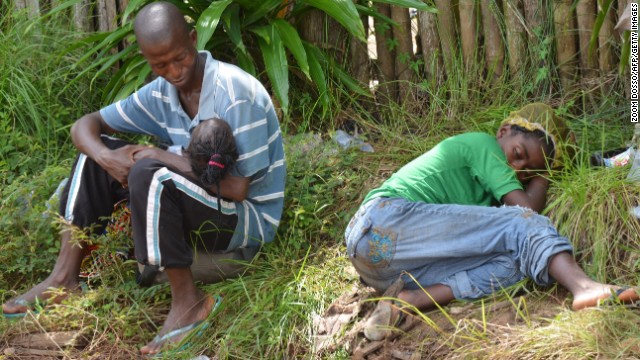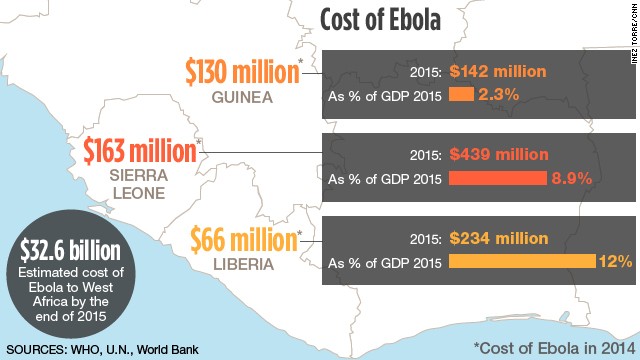September 24, 2014 -- Updated 1414 GMT (2214 HKT)
STORY HIGHLIGHTS
- The biggest Ebola outbreak in history is taking its toll in Western Africa
- Sierra Leone, Liberia and Guinea are among the most vulnerable economies in Africa
- The World Bank estimates more than $1 billion is needed to contain the outbreak
(CNN) -- The price of cassava, a root vegetable that is a staple ingredient in Liberian diets, shot up in August.
In the Redlight Markets of Monrovia, the Ebola-stricken country's capital, Liberians were forced to pay 150% more for cassava, a basic for flour and bread.
It's a small example, noted by the UN Food and Agriculture Organization, which represents the bigger economic pain hitting the countries of West Africa. The region is struggling to contain the biggest outbreak of Ebola in history.
Liberia has suffered most in the epidemic, which has killed more than 2,800 people and delivered an economic shock to some of Africa's most vulnerable economies.
Ebola cases in Liberia and Sierra Leone could rise to between 550,000 and 1.4 million by January if there are no additional interventions, a Centers for Disease Control and Prevention report warned Tuesday.
Liberia, Sierra Leone and Guinea -- the three countries facing the biggest health crisis -- are also facing huge bills to try and contain the virus.



The three countries' economies had been growing. Sierra Leone, in particular, had been identified as a country with the potential for significant growth. Before the outbreak, the IMF had forecast the country to grow by over 14% in 2014. Liberia's economy had been growing by around 10% since 2005, while Guinea had been praised by the IMF for its economic and political reforms.
Now, the World Bank estimates the outbreak will cost Sierra Leone $163 million, or 3.3% of its GDP this year. If the epidemic continues to spread, the World Bank estimates it could lose as much as 8.9% of its GDP in 2015. For Liberia, the worst case estimates of cost are $228 million, or 11.7% of GDP. In Guinea it's $142 million, or 2.3% of GDP.
Inflation has also spiked in the region, fueled by uncertainty and capital flight, while exchange rates have been volatile.
Big industries suffer
Agriculture contributes 57% of Sierra Leone's GDP, 39% of Liberia's and 20% of Guinea's. That slice of the economy is in trouble as the rice and maize harvests, which take place between October and December, loom. Fear of the disease, the introduction of curfews and the difficulties of transporting food are expected to have a significant impact on production, according to the UN Food and Agriculture Organization.
West Africa is also rich in iron and gold, and Western mining companies have a strong presence in the region. But Liberia, where 1,578 people have died from the Ebola virus, has closed all but major border crossings and introduced a temporary curfew in its attempts to contain the outbreak.
The mining industry contributes around 14% of Liberia's economy, with international companies such as ArcelorMittal, Hummingbird, Chevron and Exxon & Total operating many of the mines.
Many have imposed travel restrictions on workers and are evacuating non-essential staff from the region. If this continues, "there will be a sizable decline in production," the World Bank said.
Scare factor
But it is fear that could prove the most damaging for the countries' economies. According to Jim Yong Kim, World Bank president, the "tide of fear" triggered by the outbreak could cause 80% to 90% of the economic impact. This was the case for both the SARS and H1N1 outbreaks, and it is proving true for Ebola too.
"The fear factor from the Ebola outbreak has reduced labor force participation, closed places of employment, disrupted transportation, and motivated some government and private decision makers to close seaports and airports," Kim said at a press conference last week.
Nearly 800 people died during the 2002 -- 2004 SARS outbreak, which the World Bank estimated cost more than $40 billion in economic losses. The slowdown was mainly caused by the flight of foreign investment and a travel to affected areas falling by up to 70%.
Ebola has killed more than three times as many people so far.
Stark warning
The number of Ebola cases in the region could rise to between 550,000 and 1.4 million by January if there are no "additional interventions or changes in community behavior," the Centers for Disease Control and Prevention said.
The World Bank estimates more than $1 billion is needed to contain the outbreak and avoid long-term economic disaster.


No comments:
Post a Comment